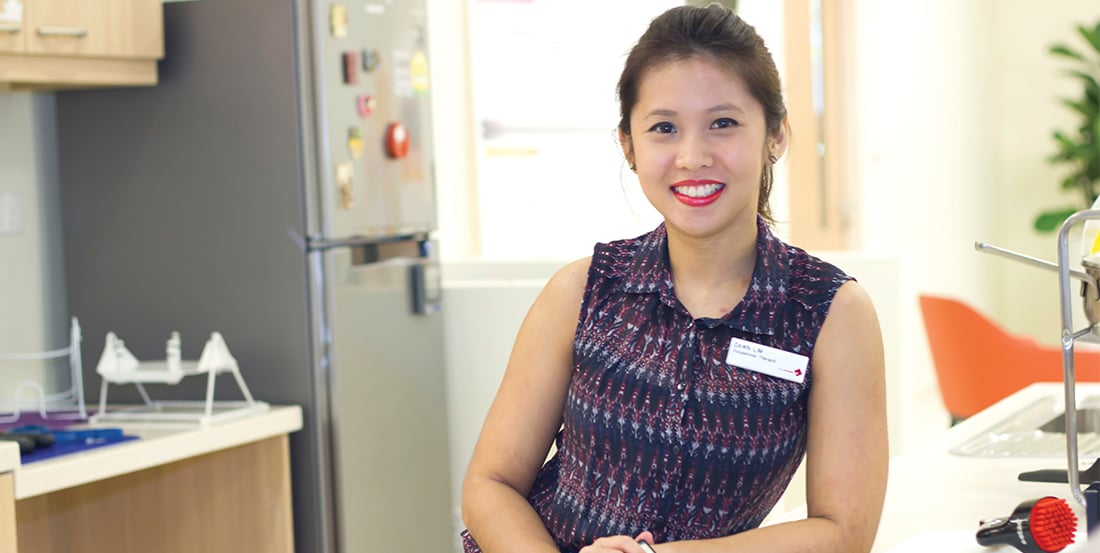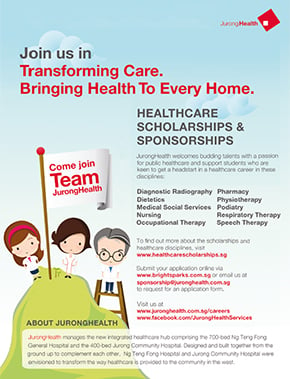O ccupational therapists work hand-in-hand with people suffering from a range of physical, mental and social conditions. While some of these conditions may arise from birth, others are a result of accident, illness or ageing. Being able to undergo therapy with a dedicated occupational therapist empowers individuals to strive towards optimal function and health.
One such occupational therapist is Healthcare Scholar Dawn Lim. Together with the team at JurongHealth, Dawn designs treatment programmes based on her patients’ unique circumstances and lifestyles. These programmes enable patients to eventually pursue their day-to-day activities independently and honourably.
Today, Dawn enlightens us with the meaningful experiences she has had at JurongHealth. She also elaborates on her roles as an occupational therapist, and what she envisions of our future healthcare sector.
What sparked your interest in the healthcare sector?
Dawn Lim: I’ve always known I wanted a job that would allow me to interact with different people and create an impact on their lives. I guess a lot of hospital dramas I watched on television did shape my interest in healthcare. As I grew older, I started to consider a career in the healthcare sector quite seriously. I was drawn to the idea of helping others regain function, being able to work with different people at various life stages, and critically understanding their unique situations.
 Dawn Lim Jia En
Dawn Lim Jia EnHealthcare Scholar
Designation:
Occupational Therapist
What opportunities did you receive as an undergraduate?
Dawn: I was fortunate to have had five varied clinical attachments. These also comprise my 8-week attachment to a retirement village in Perth, Australia! My responsibilities differed at each placement, but essentially as students, we assisted the therapists in their sessions, developed ‘soft’ skills when interacting with patients, and cultivated professionalism. My experiences exposed me to the profession outside the comforts of the classroom, and opened my eyes to various creative practices, therapies, and medical approaches. These experiences affirmed my decision to enter the healthcare sector and become an occupational therapist.
Tell us a bit more about your job.
Dawn: As an occupational therapist, I am most concerned about my patients’ ability to live independently. We work to restore a person’s ability to function, and aim to reduce the disabilities caused by their medical conditions through purposeful use of occupations. The end goal of therapy is always to ensure continued engagement in a person’s life roles, whether he or she is a parent, a student, or a participant of an activity important to them. I like to see my office as my patients’ safe haven, and where I get to work with them on a very personal level.

What would you say was fulfilling about your job?
Dawn: Seeing my patients improve and achieve their therapy goals is most fulfilling for me. When I see my former patients outside of the hospital going about their daily lives, the sense of satisfaction I gain is immeasurable.
I once had a young patient in his prime, who suffered physical impairments from a severe accident. Even turning in bed was arduous and painful. He had to undergo numerous operations and even more therapy sessions. I remember sitting down with him to set therapy goals at the beginning of his recovery process.
Today, I am pleased to say he is back in school. Although he still does certain things differently from his peers, he is still able to live his life purposefully and independently. This is the beauty of occupational therapy – the prospect of being able to overcome disability.
What’s in store for future occupational therapists?
Dawn: I would say that occupational therapy is gaining more exposure in the healthcare sector. People and organisations are becoming more aware of the various allied health professions, and the demand for them is increasing. There are only going to be more opportunities for allied health professionals to serve in this growing field.
What advice would you have for aspiring Healthcare Scholars?
Dawn: It is important to have empathy. Unless you are able to understand and empathise with your patients, you cannot truly help them. Everyone’s circumstances are different, and there is never a one-size-fits-all solution. Empathy reminds us of the need to be more caring, patient and kind towards our patients.
If you are considering to join the healthcare sector, ensure that this is what you truly want and that you will be able to commit yourself to the field. If you feel that you do indeed possess the empathy and the passion, the sector welcomes you with open arms.

